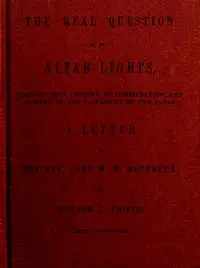"Theodicy" by Gottfried Wilhelm Leibniz is a philosophical book from the 1700s that looks at how a good God, free will, and evil can all exist together. It's a big idea in philosophy and religion, trying to figure out God's character and how the universe is morally set up. The book starts by getting into these topics and talking about the religious arguments happening back then. Leibniz shares his basic beliefs about philosophy, pushing his idea that everything fits together in a coordinated way. He goes against some popular ideas, especially the one that says the mind and body are separate and brings up his concept of pre-established harmony, which is suggesting God is in charge of coordinating everything. The beginning of the book introduces the harder questions Leibniz gets into, like how humans have free will, what is good and bad, and what God does in our lives.

Theodicy Essays on the Goodness of God, the Freedom of Man and the Origin of Evil
By Gottfried Wilhelm Leibniz
Can a world filled with evil still be created and overseen by a good and all-powerful God?
Summary
About the AuthorGottfried Wilhelm Leibniz or Leibnitz was a German polymath active as a mathematician, philosopher, scientist and diplomat who is credited, alongside Sir Isaac Newton, with the invention of calculus in addition to many other branches of mathematics, such as binary arithmetic, and statistics. Leibniz has been called the "last universal genius" due to his knowledge and skills in different fields and because such people became much less common after his lifetime with the coming of the Industrial Revolution and the spread of specialized labor. He is a prominent figure in both the history of philosophy and the history of mathematics. He wrote works on philosophy, theology, ethics, politics, law, history, philology, games, music, and other studies. Leibniz also made major contributions to physics and technology, and anticipated notions that surfaced much later in probability theory, biology, medicine, geology, psychology, linguistics and computer science.
Gottfried Wilhelm Leibniz or Leibnitz was a German polymath active as a mathematician, philosopher, scientist and diplomat who is credited, alongside Sir Isaac Newton, with the invention of calculus in addition to many other branches of mathematics, such as binary arithmetic, and statistics. Leibniz has been called the "last universal genius" due to his knowledge and skills in different fields and because such people became much less common after his lifetime with the coming of the Industrial Revolution and the spread of specialized labor. He is a prominent figure in both the history of philosophy and the history of mathematics. He wrote works on philosophy, theology, ethics, politics, law, history, philology, games, music, and other studies. Leibniz also made major contributions to physics and technology, and anticipated notions that surfaced much later in probability theory, biology, medicine, geology, psychology, linguistics and computer science.














